Former Iranian Political Prisoner Dies Suddenly
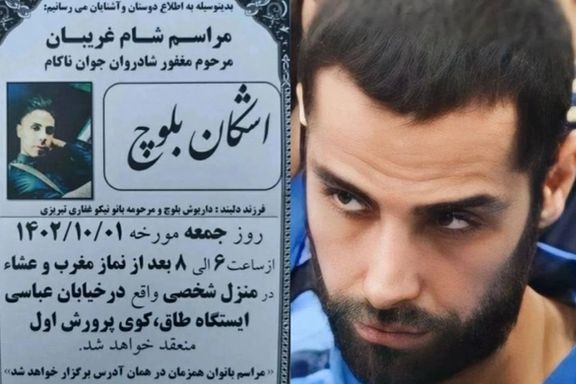
Ashkan Balouch (Baluch), a kickboxing athlete detained during Iran’s 2022 protests, has reportedly died under mysterious circumstances.

Ashkan Balouch (Baluch), a kickboxing athlete detained during Iran’s 2022 protests, has reportedly died under mysterious circumstances.
Milad Abdi, a former political prisoner once confined with Balouch in Tehran's prison, has branded his death a “suicide.” However, judicial and forensic authorities have yet to comment.
According to Abdi, Balouch, had been granted amnesty after two suicide attempts. In October 2022, he was transferred to prison by security forces on his way home and, after a period of interrogations, was sentenced to five years in prison for charges of "collusion and conspiracy against national security."
However, it is believed Balouch had been summoned to the Ministry of Intelligence office a few days ago for further interrogation. Abdi has stated, "Ashkan repeatedly said he had no role in the protests."
The Islamic Republic has executed at least eight protesters in connection with the uprising sparked in September 2022 in response to the killing of Mahsa Amini in police custody.
According to human rights organizations, at least 551 protesters, including 68 children, were killed during the uprising. At least 22 individuals lost their lives under suspicious circumstances or due to suicide, and hundreds more suffered eye injuries. Thousands more were arbitrarily arrested.

Approximately 184,000 marriages involving girls under the age of 15 were registered in Iran between 2017 and 2022 as girls dropped out of school at increasing rates.
A report from the Research Center of the Iranian Parliament said girls were dropping out of school to get married in rising numbers. "The total number of school dropouts in the academic year 2015-2016 was 862,777, and in the academic year 2021-2022, it surged by 26%, reaching 911,272."
Mansour Fat’hi, an associate professor of social welfare at Allameh Tabataba'i University, pointed to poverty as the primary issue in slum areas, underscoring that around 70% of underprivileged children find themselves in the lowest economic conditions amidst Iran's dire economic crisis.
The Ministry of Education reported that approximately 30% of high school students and 20% of girls aged 15 to 18 left school in 2022 due to early marriages.
Despite global standards considering individuals under 18 as "children", child marriages are allowed from the age of 13 for girls and 15 for boys in Iran. Supreme Leader Ali Khamenei has consistently emphasized policies promoting population growth, fertility, and early marriages.
Iran's Statistical Center recorded around 25,900 cases of girls under 15 getting married in 2022, less than the 32,000 such cases registered in 2021, suggesting discrepancies in the data released by the government.
UNICEF shortlisted Iran in the Middle East and North Africa's top five countries for child marriage in 2020 and according to Iran Open Data, one out of five marriages is among minors.
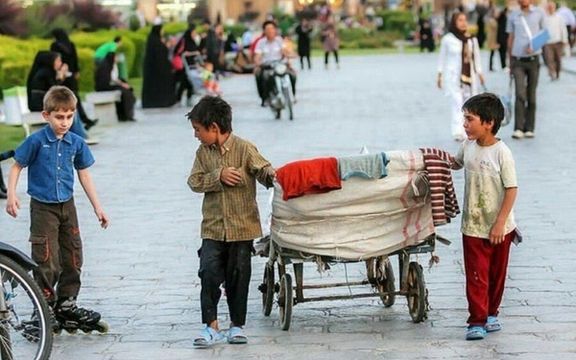
The CEO of the Association for the Support of Children has raised alarm over the deteriorating conditions for working children in Iran.
Noting that observations on the streets indicate a worsening situation, Tahereh Pazhouhesh emphasized that the age of child labor in Iran has now reached as low as seven years.
In a recent interview with Faraz Daily, she expressed concern that all activities related to child labor are being carried out in a negligent manner without proper supervision.
Criticizing the lack of expertise and awareness among city officials regarding children, she highlighted that, "Until specific budgetary resources are allocated for children, no changes will occur in the conditions of child labor."
In centers previously under the supervision of the Welfare Organization, Pazhouhesh disclosed that they used to care for child laborers. However, due to insufficient capacity, the government was ultimately compelled to release the children after just one week.
Meanwhile, Alireza Zakani, the Mayor of Tehran, asserted on Saturday that issues related to drug addiction and child labor would be resolved by the end of the Iranian year (March 20).
Zakani claimed that a special plan would be implemented to ensure that the face of Tehran is "completely clean" of the challenges posed by drug addiction and child labor before the Persian New Year, Nowruz.
However, Zakani's statements have triggered a wave of negative reactions from activists and social media users. Activists pointed out that child laborers are exposed to harassment and sexual abuse. Some social media users also attributed the growth of child labor, drug addiction, and homelessness to the policies of the Islamic Republic over the past four decades.
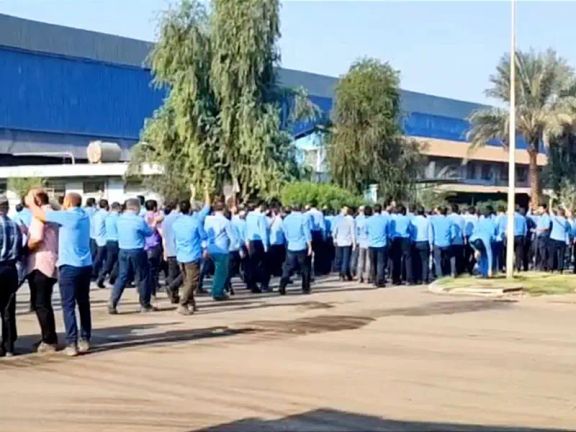
Pursuing their demands for better work condition, employees of Iran's National Steel Industrial Group rallied and initiated a strike on Saturday in Ahvaz.
The protest stems from dissatisfaction with the recent termination of positions for 21 workers and the failure to implement job classification plans.
Following the strike, workers vacated the company premises and gathered along the Ahvaz-Khorramshahr road. The protest represents the latest in a series of actions by the Iran National Steel Industrial Group employees. Over the past months, they have intermittently halted work to voice their concerns.
Video is blurred to protect workers' identities
The most recent demonstration occurred on December 20, as workers voiced their opposition to low wages, the non-implementation of job classifications, and management's disregard for their demands. Slogans such as "A worker dies but does not accept humiliation" echoed through the protest.
In a November protest , workers abstained from work for three consecutive days, emphasizing their demands for wage parity and the reinstatement of expelled colleagues.
On September 27, the Islamic Republic's judiciary sentenced 17 protesting workers from the group to imprisonment and fines. They were accused of "disrupting public order through creating disturbance and commotion" during the Iranian people's uprising following the death of Mahsa Amini in custody in 2022.
The Iran National Steel Industrial Group, previously overseen by the Amir Mansour Aria Investment Company, underwent private ownership after legal proceedings and the execution of Aria for embezzlement.
Recent months have witnessed workers from various industries, members of different guilds, and retirees organizing numerous protests to address economic conditions. Several of the gatherings have been met with crackdown by security forces, coupled with legal obstacles for protesters.
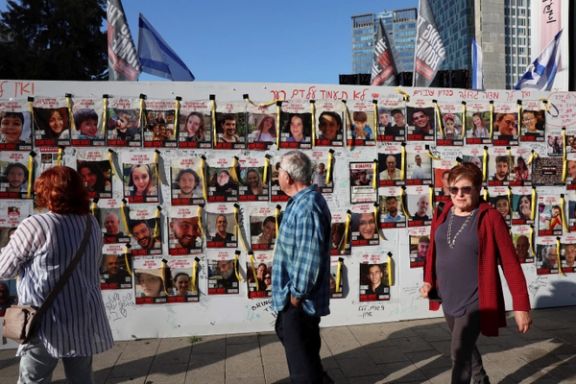
Prominent Iranian dissident Masih Alinejad has criticized the inadequate response from organizations and women's rights activists to Hamas' violence against Israeli women.
Alinejad drew attention to the parallel with sexual assault by agents of the Islamic Republic against detained Iranian protesters.
"If we do not unite now, terrorists will certainly commit more sexual assaults against women," warned Alinejad. Expressing confusion over the lack of global solidarity in condemning the Hamas attacks, she pointed out the importance of a united front against such atrocities.
Hamas gunmen sexually assaulted dozens of women during their October 7 attack on Israel and took scores hostage. Reports say that many of the female hostages have been raped in Gaza.
Alinejad highlighted a distressing similarity in the treatment of protesters by the Islamic Republic, citing incidents following the murder of Mahsa Amini at the hands of morality police. She emphasized that rape should never be used as a weapon of war and stressed the urgency of international unity to prevent further victimization.
Protesters who experienced sexual harassment and assault during the 2022 anti-government movement in Iran have shared their harrowing stories with Iran International. Both female and male victims, some as young as eighteen, revealed the widespread nature of sexual violence against detained protesters.
The US Department of State condemned reports of sexual assault against protesters, denouncing the Iranian regime's systematic use of sexual violence to “instill fear and silence victims as reprehensible.” The department praised the courage of Iranians standing against such actions and called for global support against such acts.
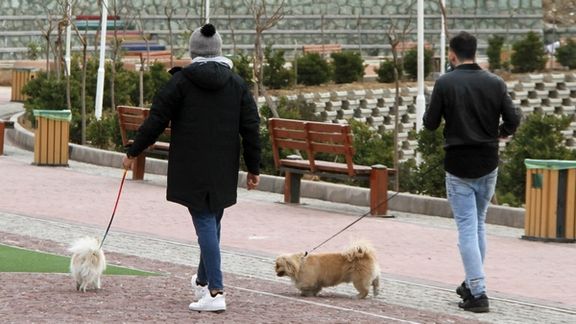
The Tehran municipality has grown increasingly critical of dogs, signaling that the authorities' snarls are a prelude to an impending crackdown on man's best friend.
In a renewed campaign against dog ownership, Tehran Mayor Alireza Zakani said this week, “Dog-walking in the city is very wrong and illegal, especially when done without rules and regulations. Legal authorities must intervene and change the culture in such a way that if someone wants to walk a dog, they do it by the rules.” Zakani's deputy, Hossein Nazari, described dog walking as one of "challenges" for the capital.
The religious regime views keeping dogs as a symbol of Westernization that can be dangerous and should be prohibited. Dogs are generally considered 'najis' or 'impure' in Islam and banned in public places by some majority-Muslim countries including Saudi Arabia. Iranian parliamentarians proposed a bill last year banning selling and keeping of pets, claiming that the ban was meant to protect public health. While working dogs have always been common in Iran’s rural areas and on farms, keeping pets has only recently become fashionable in urban areas despite occasional police crackdowns.
Several of the growing number of dog owners in the capital shared their grievances with Iran International, detailing their persistent conflict with authorities and religious individuals subscribing to the Islamic Republic’s rancorous views on dogs.
The owner of Snow, a black terrier mix, said she consistently faces objections from neighbors when walking her dog in the green areas of their apartment complex in northern Tehran. Non-dog-owning residents argue that dogs should be prohibited in common areas, citing concerns about their children playing there. She added that the situation escalates on the streets, highlighting instances where her friends received fines for having their dogs in cars outside designated boxes.

The issue extends beyond communal building areas, as experienced by Toffee's owner, who has an apricot toy poodle. Residing in a central Tehran neighborhood with a conservative social context, she faced persistent harassment from neighbors, ultimately prompting her to move. Her religious neighbors were intolerant of having a dog in the building, continually threatening to file a lawsuit for her eviction, she said.
In the absence of specific regulations regarding dogs, authorities employ alternative measures to exert pressure on dog owners, primarily through laws governing shared spaces within buildings. These regulations imply that owning and keeping animals, including dogs, in communal areas is prohibited. The Islamic Penal Code, particularly Article 688, reinforces this prohibition by penalizing actions deemed threatening to public health, citing potential health risks associated with the possession of dogs. Violations may result in legal consequences, as neighbors have the ability to file complaints against such practices.

The owner of Woody, a golden cocker spaniel, said she faces crippling stress whenever she tries to take Woody for walks, adding that the recent warnings from the authorities have made the situation even more stressful. “Dogs have no rights in Iran,” she lamented, referring to a lack of clear regulations on where dogs are permitted.
The absence of clear regulations also leads to other legal challenges, as seen in the case of Leo's owner, who lost her dog due to veterinarian malpractice. Recounting her experience, she said, "I attempted to seek legal action for my lost dog, but I was advised not to waste my time and energy as it would be futile." She pointed out, "Even human beings struggle to find justice in Iran, let alone the poor dogs."

Earlier in the year, a real estate agency was sealed off and its owner arrested after a video went viral of the property agency transferring the ownership of an apartment to a dog. The footage showed an Iranian couple signing a contract transferring the title of their apartment to their small furry white dog Chester. Iran’s police and Tehran’s deputy prosecutor Reza Tabar mentioned “issuing an invalid contract for an apartment unit” as the reason behind the arrest. Without elaborating on the legal grounds, Tabar said “this action is illegal and was meant to demean the norms of society.”
While officials such as the mayor of Tehran argue for the need to regulate dog ownership, implementing effective laws presents a significant quandary. Crafting regulations would inadvertently entail granting certain freedoms to dogs and their owners, such as allocating designated areas or parks for walks – a prospect that contradicts the state's ideological stance.
The proposed legislation, which was never followed up and labeled as a waste of parliament’s time, envisaged a monetary fine ranging from $900 to $2,700, along with the possibility of impounding the animal. Additionally, real estate agents would be required to prohibit dogs in rental agreements within three months of the law's enactment, with corresponding fines for non-compliance. Individuals walking their pets in the street could potentially face a three-month jail term, or if driving with their dog, the confiscation of their car for three months.
Previous attempts to address the issue involved police campaigns rounding up dogs and their owners, serving as more of an intimidation tactic than a systematic solution. One major impediment to enforcement is the lack of proper facilities to accommodate detained dogs. With no dedicated spaces to house them and a shortage of personnel to care for the animals, the authorities face a logistical dilemma in cracking down on dog owners.
The recurrent conflict surrounding dog ownership tends to resurface intermittently but often becomes overshadowed by popular protests on broader human rights issues or economic challenges. The government's persistent struggle to regulate dog ownership represents another intrusion into citizens' private lives, adding to a myriad of existing bans, including restrictions on alcohol consumption, dating, public appearances without "proper hijab" for women, mixed-gender parties, and singing by women.